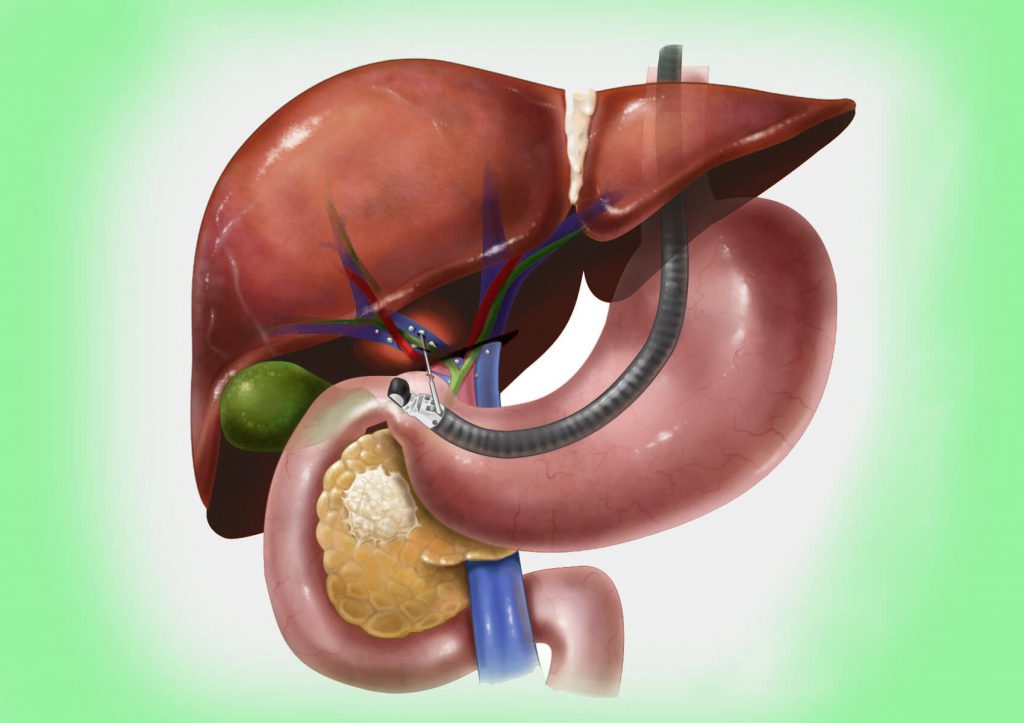What Is ERCP?
ERCP is a medical procedure that helps your doctor check the tubes in your pancreas and liver. They use a flexible, lighted tube (endoscope), which is like the thickness of your index finger. This tube goes through your mouth, into your stomach, and then into the first part of your small intestine (duodenum). In the duodenum, they find a small opening called the ampulla and pass a small plastic tube (cannula) through the endoscope into this opening. They inject dye (a special material) and take X-rays to look at the tubes of your pancreas and liver. Digestive Endoscopy Clinic provides endoscopic retrograde cholangiopancreatography (ERCP) services. This minimally invasive procedure enables experts to diagnose biliary and pancreatic disease safely and effectively. If you are looking for an ERCP Endoscopy Treatment in Rasta Peth Pune then Digestive Endoscopy Clinic can be of great option for you.

Why is an ERCP Performed?
Dr. Suresh Jain has done ERCP Test in Pune to find and treat problems in the pancreatic duct and bile duct. The most common reasons for ERCP include:
ERCP is a procedure commonly done to check and fix issues with the pancreas or bile ducts. It’s used to figure out what’s causing symptoms like stomach pain, weight loss, or yellowing of the skin. Doctors may recommend ERCP if blood tests or imaging tests, like ultrasound or CT scans, show something unusual in these organs.
People might also have ERCP before or after gallbladder surgery to help with the procedure. The doctor can use ERCP to find and remove bile duct stones or treat tumors, whether they are cancerous or not. In some cases, it can even help with complications from gallbladder surgery.
For those with suspected or known pancreatic problems, ERCP helps decide if surgery is needed and what type of surgery would be best. Sometimes, ERCP can also be used to remove pancreatic stones.
How ERCP Procedure Performed at Digestive Endoscopy Clinic?
Before the Procedure: The Digestive Endoscopy Clinic team will give you some instructions before doing the ERCP procedure. They will tell you not to eat or drink anything for about 8 hours before the examination. Your doctor will be more specific about when to start fasting, depending on your test schedule. They may need to adjust or stop some of your current medications. Most medications can be continued as usual, but you should talk to your doctor about medicines like aspirin, Vitamin E, anti-inflammatories, blood thinners, and insulin. Also, let your doctor know about any allergies to medications, iodine, or shellfish. Tell your doctor if you need antibiotics before dental procedures, as you may also need them before ERCP.
During the Procedure: At the Digestive Endoscopy Clinic, when you have the procedure, they’ll ask you to lie on your left side. They’ll also put a mouthguard in to protect your teeth. Dr. Suresh Jain, who is known as the best endoscopist in Pune, will use a tool called an endoscope to look inside your stomach and duodenum.
The endoscope has a bright light and a tiny camera at the end, sending pictures to a big screen for the doctor to see. Then, through the endoscope, a very thin tube (less than 2mm wide) called a catheter is passed down until it reaches a point in your small intestine called the papilla. This is where the bile and pancreatic ducts drain. Next, a dye that shows up on X-rays is passed through the catheter into the bile and pancreatic ducts. After that, an X-ray of your upper abdomen is taken to get a better look.
After the Procedure: You might have bloating or cramps in your belly for about an hour after the examination, but you shouldn’t feel any pain. If you do have pain, bleeding, or a fever, tell your consultant right away.
wHAT CAN BE EXPECTED DURING THE ERCP?
Before the test starts, your throat will be sprayed with a local anesthetic to numb it and prevent gagging. You will get medication through an IV to help you relax during the examination. While lying comfortably on an X-ray table, a thin tube called an endoscope will be gently passed through your mouth, down your esophagus, and into your stomach and duodenum. The procedure usually takes about an hour, but it may vary depending on what needs to be done. The endoscope won’t affect your breathing. Most people either fall asleep during the procedure or find it only a bit uncomfortable. You might feel a little bloated during and after the procedure because of the air used to inflate the duodenum. As X-ray contrast material is injected, you may feel some minor discomfort.
Frequently Asked Questions (FAQ's):
Digestive Endoscopy Clinic is one of the best ERCP treatment procedure clinic for different endoscopic procedures such as colonoscopy, Sigmoidoscopy, and ERCP Test.
An ERCP is most commonly used to remove gallstones in the bile duct (also called bilestones). It is also used to remove stones in the pancreatic duct
The duration of the procedure varies, but it generally takes between 30 to 90 minutes, depending on the complexity and findings.
